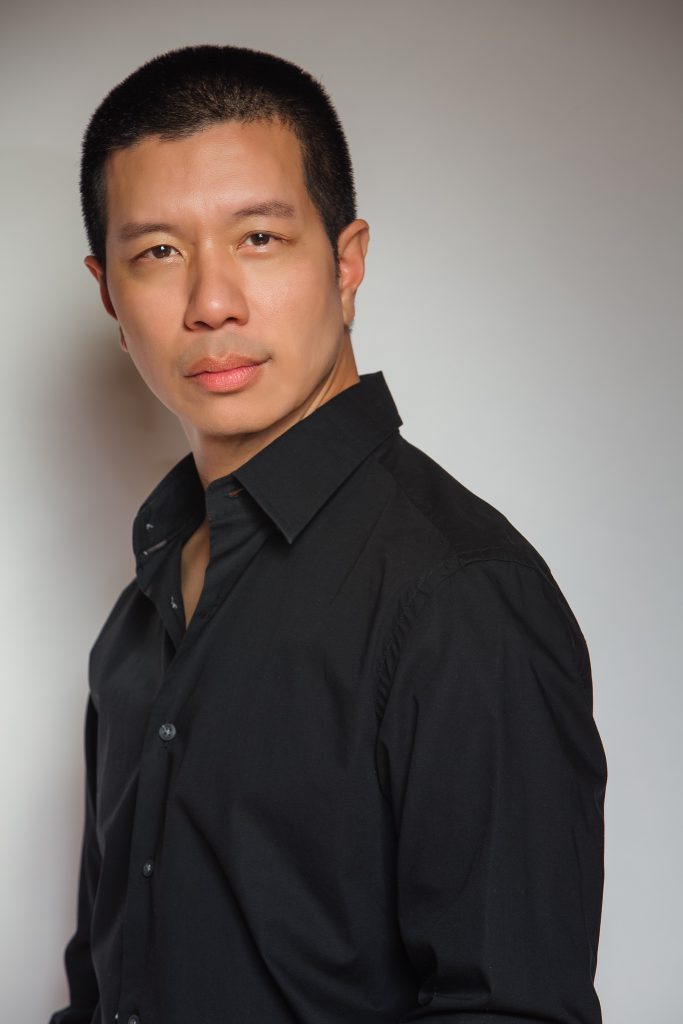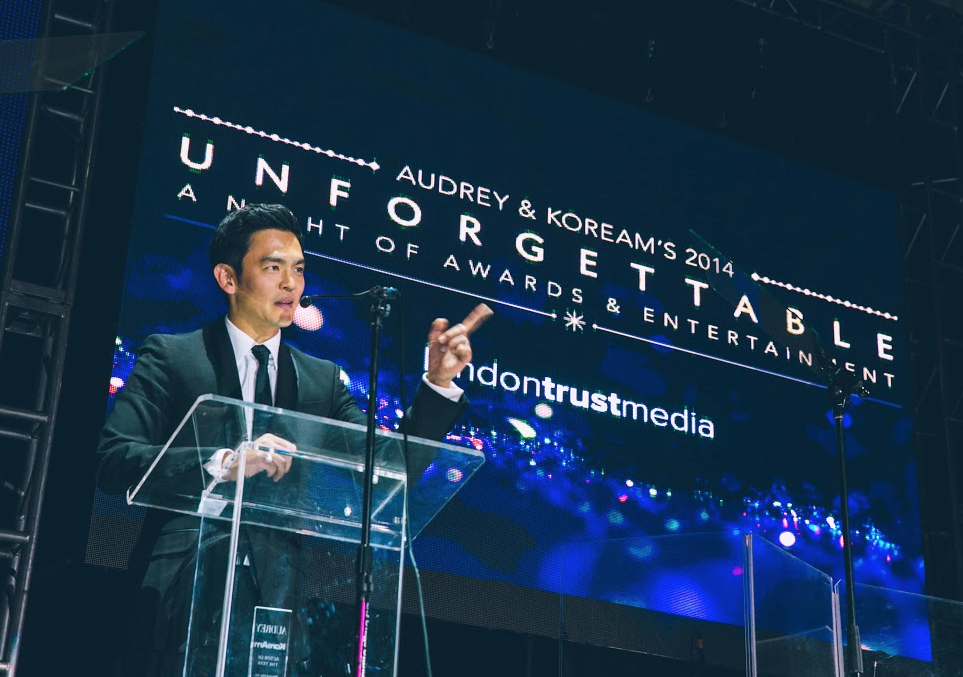Grimm fans can agree that Reggie Lee brings his character to life perfectly, from every look to every snarky punchline. Now in Grimm‘s 4th season, Lee’s character–Sergeant Wu–reaches a big arc in the storyline which will be revealed in the upcoming episode.
Grimm is an NBC television series which is “basically about this one detective who is a descendant of the Grimms. The Grimms, meaning the Grimm brothers,” Lee explains. “Their descendants can see people transform into different creatures, or animals, or folkloric creatures. These creatures (or “Wesen”) are basically acting out a crime, so we’re basically solving crime.”
Lee’s character, Sergeant Wu, is the first-line supervisor of the main characters–Detective Nick and Detective Hank. He’s the one in charge of their assignments despite his unawareness of the Wesen world. “I don’t know these things,” Lee says of his character. “I’ve never known it until I saw one last season, and it jousled my world.”
Lee previously starred in many roles such as Tai Huang in Pirates of the Caribbean: At World’s End and Lance Nguyen in The Fast and the Furious. Of course, the road to success is never an easy one. “It took a lot of work,” Lee reflects. “I can say I worked my butt off to get to where I am.”
Lee was kind enough to take some time out to talk to us about what it was like growing up, all the things leading to his role on Grimm and what’s next in store for him.
For someone born in Quezon City, Philippines, how was the transition to the United States?
“When I first came to the States, I was 5 and I remember my mom telling me I would not speak a word of english on the plane. I refused. Then I got here, and you know how it is when you get into the school system. From that point on she said my words were all slang. It was hysterical.”
While growing up in Ohio, Lee was the only Asian (possibly the only person of color) in his graduating class of 200. He found himself struggling to embrace his culture as it conflicted with his desire to fit in with his classmates.
“But to me, that was normal. To me, growing up in the Midwest, that was normal. I was like, ‘Wait a minute, I’m different. Why am I so different? I don’t want to be different.’ I was doing everything I could to fit in…maybe it was partly that that made me go ‘I’m gonna be an actor!'”
Moving from the Midwest to Los Angeles, Lee talks about the differences he immediately saw amongst the communities:
“[In Los Angeles], you have the support of an entire kind of very integrated system where everyone’s different. It did teach me a lot. Don’t get me wrong, I loved growing up in Ohio. It was a very suburban lifestyle and I had some great friends that were really supportive, but I lost my ethnicity there. I lost kind of my love for being Asian, and maybe everyone loses that at a certain time.”
What are your thoughts on being an Asian American actor in the industry?
“I think Asian American actors are now starting to get a voice. I think it was great when they started including us as series regulars, but then I think the next step was to make that character three-dimensional and give that character a life, and to move the plot forward with that particular character. Versus just have him be apart of a “quota” to meet some kind of racial standards.
Sometimes people ask me, ‘What do you wanna play?’ I was like, ‘A regular freaking guy. Just a regular guy. That has feelings, and just goes through life, goes through daily life like most of the caucasian actors you see on screen.'”
Lee tells us about the many auditions he’s turned down because of the issues he saw in characters being stereotypical. He recalls one audition that left him in disbelief, and couldn’t bring himself to read on.
“He took my call and I said, ‘Listen, I am purposely not furthering this stereotype of Asian men. I would love to read for you, and I would love to work with these people. If the character changes at all in any way, please let me know.’ And he said, ‘I respect you, and I agree with you. So if it changes we’ll give you a call.’ It made one particular person a star, but I would be unhappy. I’d be unhappy because I think I’d be pigeon-holed in that particular thing to do.”
Thankfully, he does notice a change in the climate of Asian American representation on screen, including his character on Grimm. “It’s changing,” Lee says of Asian Americans on television. “And I hope it’s changing quickly.”

What about your role on Grimm? How do you feel about the character development?
“I think that they’ve done such a great job with this character here, but it’s been because of conversation. The showrunners are also learning, and [I’m] learning from the showrunners because they have constant conversation with the network. It’s like there’s a hundred chefs in the kitchen.
They don’t want stereotypes at all. It really started from the get-go where this character wasn’t as fleshed out in the first couple seasons, but he was never a stereotype. He could’ve been any race at all, but he was a smart character that was sarcastic and really good at his job. And fortunately, later I got more involved in terms of the depth of my feelings, which was really great to tap into. Because rarely do you get to tap into that as an Asian American actor. I’m realizing that more and more as I continue work.”
He began to draw parallels from working in the industry to his own life. Just like acting, it’s always about looking for the next thing–or step–in life and asking the questions, “Now what? What’s next? What makes it exciting?” He makes philosophical points of “stability is such an illusion” and “control is such an illusion” referring to the fact that nothing in life is guaranteed because it can easily go away tomorrow, whether it’s a TV show or a house.
“I think especially as Asian Americans, you’re so busy trying to achieve. And that’s fine, if that’s your happiness, but a lot of times we confuse it. It seems like an external happiness because we’re achieving things, but then all you want is more of that achievement. You’re not really enjoying what you’ve achieved, or the fruits of it, or the process, or the journey.”
Coming from someone who’s played a multitude of different Asian characters, do you have intentions of continuing to represent your Filipino Roots?
“It was very [rare] that you would see a Filipino storyline. That’s why the Aswang episode was really great, because it was a full fledged episode of a Filipino storyline. Now that my character is fully Filipino and everyone knows that, we’re continuing the tradition of keeping me that way and hopefully bringing some more of that culture in.”
Lee reveals that he is actually a big fan of “Filipino culture and the Filipino actors” and expresses interest in some day working with other Filipinos in the entertainment industry. In addition to that, he enthusiastically talks about wanting to film in the Philippines as well as potentially producing Filipino stories and bringing them to the US.
“Outside of the show, what I would really love to do is bring more Filipino culture and stories to the United States, start a production company and start telling these stories here. That would be my dream, dream, dream, dream goal.”
Any last comments to our readers? Or to the Grimm fans?
“Just a big shoutout. There have been a slew of Asian American fans that watch the show and caught on because of my character–amongst other things. But I just wanna give a big thanks for their support, and if they ever wanna reach out to me I’m on Twitter (@mrreggielee)”
If you want to catch Reggie Lee on TV, the upcoming episode of Grimm will be airing Fridays 9/8c on NBC. Don’t miss the big moment!
All photos courtesy of Bryan Geli
[wp_ad_camp_2]








